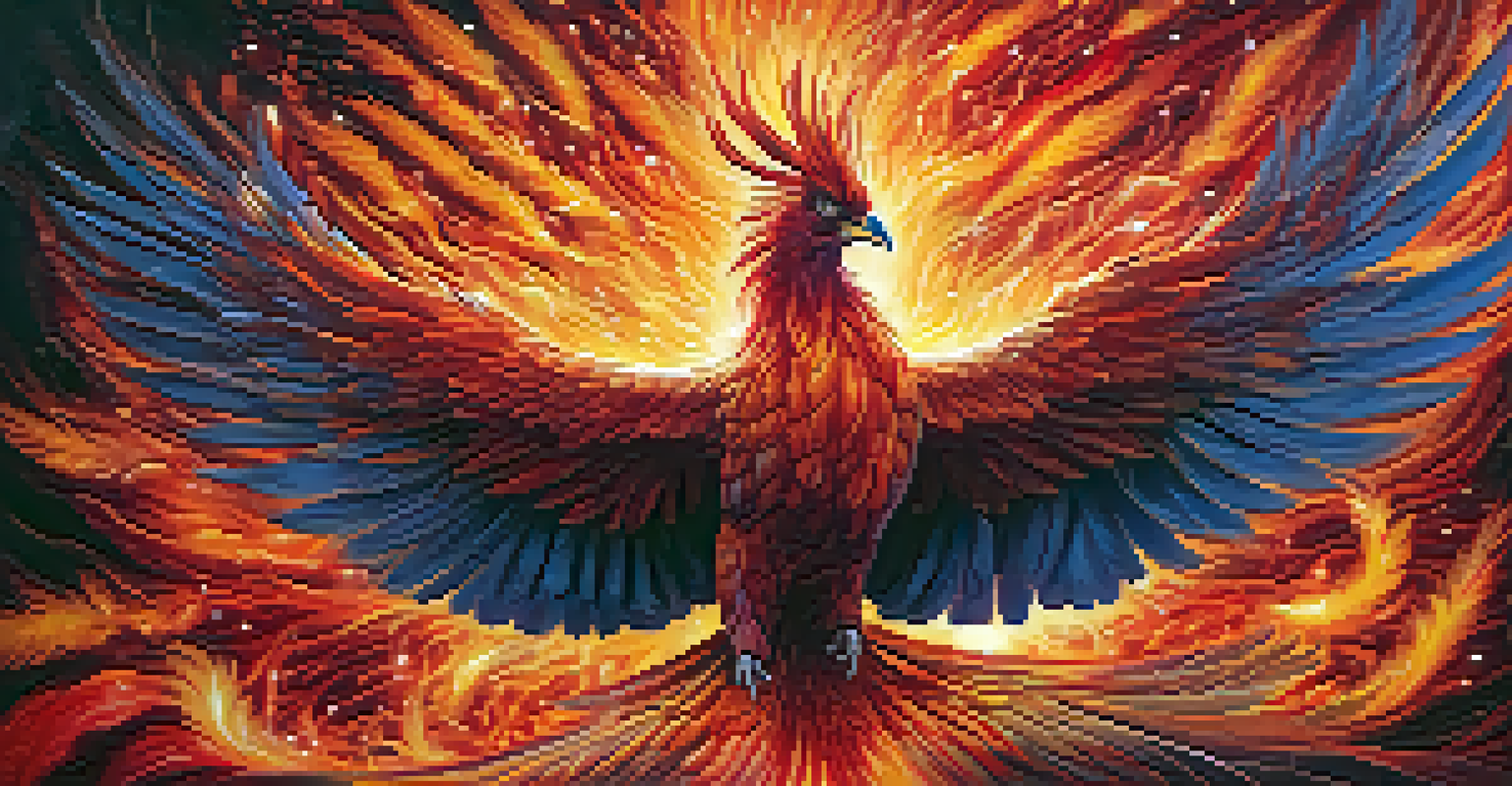Myth and Spirituality: Ancient Tales in Modern Contexts

Understanding Myths: More Than Just Stories
Myths are often dismissed as mere tales from the past, yet they carry deep meanings that resonate through time. They are stories that reflect the beliefs, values, and fears of the cultures they originate from. By examining these ancient narratives, we can uncover universal themes that still impact our lives today.
Myths are public dreams, dreams are private myths.
For instance, the myth of Hercules highlights the struggle of overcoming personal challenges, a theme that many can relate to in their own lives. These stories serve as mirrors, reflecting our aspirations and dilemmas, making them relevant even in a modern context. This connection is what makes myths a powerful tool for understanding human experience.
Moreover, myths often address spiritual questions that remain pertinent. What is our purpose? How do we find balance in a chaotic world? By revisiting these ancient tales, we can gain insight into our own spiritual journeys and the challenges we face in contemporary life.
The Role of Spirituality in Ancient Myths
Spirituality is woven into the fabric of many ancient myths, providing a sense of connection to something greater than oneself. These stories often explain the origins of the universe, the nature of humanity, and the divine. They serve as a guide for moral conduct and understanding the human condition.

Take, for example, the myth of Prometheus, who brought fire to humanity. This act symbolizes enlightenment and the quest for knowledge, which is a spiritual pursuit. It raises questions about sacrifice, innovation, and the consequences of defying divine authority, themes that are still relevant in today's technological age.
Myths Reflect Human Experience
Ancient myths resonate with contemporary life, revealing universal themes of struggle, purpose, and resilience.
By analyzing these spiritual elements, we can explore how they inform our contemporary beliefs and practices. They invite us to reflect on our values and how we relate to the world around us, encouraging a deeper connection to our own spirituality.
Modern Interpretations of Ancient Myths
In today's world, we often reinterpret ancient myths to fit our contemporary experiences. This process can be seen in literature, film, and art, where old stories are reimagined to address current societal issues. For example, modern retellings of myths can explore themes of identity, power, and morality in ways that resonate with today's audience.
The great myths are the foundation of our existential understanding.
Consider how films like 'Wonder Woman' draw inspiration from Greek mythology, transforming figures like Zeus and Ares into symbols of modern struggles. These adaptations not only entertain but also prompt discussions about gender roles, heroism, and justice, showcasing the timeless relevance of these narratives.
Such reinterpretations allow us to engage with these myths actively, making them living stories rather than relics of the past. This engagement fosters a sense of continuity, reminding us that while the world changes, the core questions of existence remain the same.
The Impact of Myth on Personal Spirituality
Many individuals find solace and guidance in ancient myths, using them as a framework for their spiritual beliefs. These stories can provide comfort during challenging times, offering lessons on resilience and hope. They serve as a reminder that others have faced similar struggles and emerged stronger.
For instance, the tale of Odysseus, with his long journey home, resonates with anyone who has experienced feelings of dislocation or uncertainty. This myth can inspire us to persevere, showing that the journey itself can be just as important as the destination. In this way, myths become personal guides on our spiritual paths.
Spiritual Insights from Myths
Myths provide valuable moral guidance and spiritual reflections that help individuals navigate their personal journeys.
Furthermore, engaging with these narratives encourages self-reflection and personal growth. By exploring the trials and triumphs of mythic heroes, we can better understand our own challenges and the choices we make, reinforcing the idea that spirituality is an ongoing journey shaped by our experiences.
Cultural Variations of Myths and Their Spiritual Insights
Across cultures, myths share similarities yet also reflect unique spiritual insights. From the creation stories of different civilizations to hero myths, each culture offers a distinct perspective on the human experience. These variations enrich our understanding of spirituality and highlight the diversity of beliefs around the world.
For instance, the creation myth of the Hindu god Vishnu differs significantly from the Judeo-Christian account found in Genesis. Each narrative reveals not only differing views of creation but also varying understandings of divine purpose and humanity's role. Exploring these differences helps us appreciate the richness of spiritual thought across cultures.
These cultural myths can also foster dialogue between different spiritual traditions. By recognizing common themes, such as the struggle between good and evil, we can cultivate mutual respect and understanding, moving towards a more interconnected and compassionate world.
Harnessing Myths for Modern Spiritual Practices
Incorporating ancient myths into modern spiritual practices can enhance personal growth and connection. Many people draw inspiration from mythological stories during meditation, rituals, or creative endeavors. By doing so, they tap into the wisdom of these tales, allowing them to inform their spiritual journeys.
For example, using the myth of the Phoenix, which symbolizes rebirth, can motivate individuals during times of personal transformation. This narrative can be invoked to inspire hope and resilience, encouraging individuals to rise from their challenges stronger than before. Such practices highlight how myths can actively contribute to spiritual well-being.
Cultural Diversity in Myths
Exploring different cultural myths enhances our understanding of varying spiritual beliefs and fosters mutual respect.
Moreover, integrating myth into our daily lives can also foster community. Group discussions or workshops centered around mythological themes can create spaces for shared experiences and collective growth, reinforcing the idea that we are all part of a larger story.
The Future of Myths in Spiritual Discourse
As we continue to navigate the complexities of modern life, the role of myths in spiritual discourse will likely evolve. With the advent of technology and globalization, new narratives will emerge, blending ancient wisdom with contemporary experiences. This evolution can lead to rich discussions about spirituality that are inclusive and diverse.
For instance, the rise of social media has allowed for the rapid sharing of myths from various cultures. This exposure can spark interest and dialogue, encouraging individuals to explore spiritual concepts that resonate with them. Such interactions can help bridge gaps between different belief systems, fostering mutual understanding.

Looking ahead, it's essential to embrace this dynamic nature of myths while remaining grounded in their original teachings. By doing so, we can ensure that these ancient tales continue to enrich our personal and collective spiritual journeys, proving that the wisdom of the past is invaluable in shaping our future.